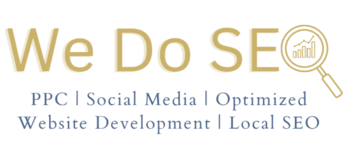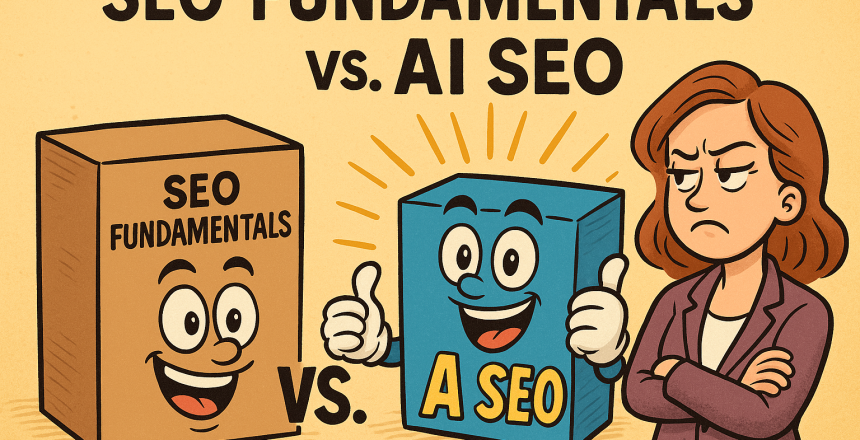AI SEO vs. Real SEO: A Founder’s Take on What’s Actually New (and What’s Just Repackaged)
By Krista Barnes, Founder & CEO of WeDoSEOLLC.com
If you’ve been shopping for SEO services lately, you’ve probably noticed something: suddenly everyone’s selling “AI SEO.”
As someone who’s been in this space for nearly two decades, I’ve seen the cycles — from “mobile-first SEO” to “voice SEO” to now “AI SEO.” And while innovation in our field is very real, so is the spin.
Let’s talk honestly about what’s actually changing — and what’s just clever rebranding.
AI Search Demand Is Real — But So Is the Hype
There’s no denying that search is evolving fast.
AI-driven platforms like ChatGPT, Perplexity, and Claude are reshaping how people discover information.
AI-sourced traffic has grown over 500% year-over-year (2024–2025) — and that’s meaningful.
Naturally, agencies are racing to productize it. “AI SEO,” “GEO” (Generative Engine Optimization), “AEO” (Answer Engine Optimization) — all pitched as something entirely separate from traditional SEO.
The sales narrative usually sounds like this:
“Traditional SEO handles Google and Bing. But now you need AI SEO to optimize for ChatGPT and other AI search tools. They work differently — and you’ll fall behind if you don’t adapt.”
There’s truth in that — AI platforms do retrieve and rank information differently.
But here’s where I urge caution: most of what’s being sold as “AI SEO” is simply good SEO fundamentals, dressed in new buzzwords.
What’s Being Repackaged as ‘AI SEO’
Over the past year, I’ve evaluated dozens of these new “AI SEO” offerings — from enterprise-level proposals to Fiverr gigs. The patterns are consistent.
Here’s what they claim — and what’s really happening behind the curtain:
| What You’re Told | What’s Actually Happening |
|---|---|
| “AI-powered semantic analysis and predictive keyword intelligence.” | Keyword research using better tools. Still about understanding audience intent, competition, and opportunities. |
| “Machine learning content optimization that aligns with AI algorithms.” | Same principles: analyze top-performing content, fill gaps, and create value. AI just speeds up the research. |
| “Entity-based authority building for AI platforms.” | PR, citations, and reputation — the same trust-building work we’ve always done. Authority can’t be automated. |
In short:
The tools have evolved.
The strategy hasn’t.
Where AI Actually Changes the Game
Let me be clear — I’m not anti-AI. At We Do SEO, we use AI every single day.
It helps us analyze massive data sets, map topical clusters in minutes, and accelerate technical audits that once took hours.
AI does change workflows:
-
It enables passage-level optimization (since AI tools read chunks, not full pages).
-
It rewards semantic clarity and structured data.
-
It values citations and entity relationships over raw backlinks.
But these aren’t new principles — they’re extensions of what seasoned SEOs have always done.
In 2014, we optimized for featured snippets.
In 2020, Google rolled out passage ranking.
Now, in 2025, we’re optimizing for AI retrieval.
It’s evolution, not revolution.
The Real Risk: Chasing Platform-Specific Hype
Here’s what concerns me:
I’m already seeing agencies push risky, short-term “AI visibility hacks” — cloaked content, invisible passages for LLMs, scaled prompt farming.
This feels eerily familiar. We saw the same pattern with early blackhat SEO tactics before Google’s Panda and Penguin updates wiped out entire websites overnight.
AI platforms like Perplexity and ChatGPT will evolve just as quickly — developing their own authority scoring, spam filters, and content trust systems.
The sites gaming the system today will be the ones penalized tomorrow.
That’s why we focus on building for longevity, not algorithm loopholes.
What Actually Drives Sustainable Results
After working through countless algorithm shifts — and now the rise of generative search — I can tell you what hasn’t changed:
Deep audience understanding always wins.
Quality and expertise build real trust.
Authority comes from consistency and authenticity.
True SEO strategy starts with business goals, not tools.
At We Do SEO, our framework hasn’t changed — it’s only evolved to include AI as a supporting force, not a replacement for strategy.
We use AI to enhance research, streamline reporting, and automate repetitive tasks — freeing time for what truly matters: human insight and creativity.
Questions Every Business Should Ask Before Hiring an “AI SEO” Agency
When you’re evaluating these shiny new “AI SEO” packages, ask these five questions:
-
How do you integrate AI into a broader SEO strategy?
AI shouldn’t be a siloed service — it should enhance your core visibility strategy. -
Can you show measurable business results, not just visibility metrics?
AI citations mean nothing if they don’t drive qualified leads or conversions. -
Do you lead with tools or strategy?
The best agencies start with your goals, not their dashboards. -
What’s your approach to content prioritization?
Real optimization balances search data, user intent, and brand positioning. -
How do you future-proof results across Google and AI platforms?
The answer should reflect a unified strategy that scales across evolving search ecosystems.
The Bottom Line: AI Is a Tool, Not a Strategy
AI isn’t replacing SEO — it’s redefining efficiency, not fundamentals.
At We Do SEO, we see AI as an accelerator — helping us move faster, analyze deeper, and make smarter decisions.
But the foundation remains human:
→ Empathy for your audience.
→ Expertise in your craft.
→ Execution that earns trust.
Real competitive advantage won’t come from chasing every new buzzword.
It comes from aligning timeless SEO principles with the intelligent use of new technology.
That’s what builds sustainable visibility — across Google, ChatGPT, Perplexity, and whatever’s next.
Krista Barnes
Founder & CEO, We Do SEO, LLC
Helping brands stay visible — in Google, AI search, and beyond.

